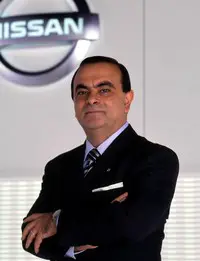Nissan CEO: Price hikes likely in Japan
 Carlos Ghosn |
Nissan chief says price hikes likely in Japan amid soaring material costs
YOKOHAMA, Japan June 25, 2008; Yuri Kageyama writing for the AP reported that Nissan Motor Co., Japan's third-biggest automaker, will likely raise prices for its vehicles in the Asian nation as soaring prices for steel and other raw materials boost production costs, Chief Executive Carlos Ghosn said Wednesday.
Ghosn, speaking to reporters after a shareholders meeting, said price increases were probably inevitable in Japan, following those already announced in the U.S. and Europe. He said Nissan may have to raise their prices 2 percent or 3 percent.
He predicted that all Japanese automakers would be forced to raise prices, especially as steel costs are expected to keep climbing -- although it would be hard for Nissan to be the first to do so when rivals like Toyota and Honda haven't.
"In pricing, the industry has no choice," Ghosn said after addressing more than 2,000 shareholders gathered at a convention center in Yokohama, southwest of Tokyo. "At the end of the day, we are sure everyone is going to do it."
Nissan, as well as Toyota and other manufacturers, have already raised the U.S. prices of some models.
Japanese automakers, while faring better than American rivals General Motors Corp. or Ford Motor Co., are all struggling to maintain profits amid a stronger yen, higher material costs and sluggish U.S. and Japanese markets.
Earlier in the day, Ghosn sought to allay fears about the company's declining share price on Wednesday, saying the fall was due to soaring oil costs, a U.S. economic slowdown and other factors that were hurting all automakers.
Ghosn, who also serves as head of the Japanese automaker's alliance partner Renault SA, told the shareholders' meeting that a stagnant Japanese auto market and rising steel and materials costs were also to blame for the company's falling share price.
Nissan shares have fallen 37 percent over the last 18 months and 14 percent since the start of the year. On Wednesday, they inched up to 899 yen (US$8.33).
In outlining Nissan's five-year plan through 2012, Ghosn vowed that Nissan would continue to grow in the years ahead by expanding in emerging markets such as China, Russia, India and Brazil. He acknowledged, however, that the same kind of growth cannot be expected in the traditional markets of the U.S., Europe and Japan.
He said Nissan's strategies will not be changed because of share fluctuations.
He outlined to shareholders some of those strategies, including Nissan's cheap "entry-level car," promised for 2011, to respond to the needs of emerging markets.
The company is also working on a zero-emission electric vehicle to address ecological concerns, Ghosn said.
"I don't think what we are seeing today is related to the performance of the company," Ghosn said in response to a shareholder's question about Nissan's faltering stock price.
He pointed out that Toyota Motor Corp.'s stock was down 15 percent this year. The entire Japanese stock market was also suffering, he said.
Shareholders, with 99 percent of the vote, approved 390 million yen (US$3.6 million) bonuses for nine directors for the fiscal year just ended.
Ghosn acknowledged Nissan's executive pay was far higher than the compensation at Toyota, but he said that was because Toyota executives were almost all Japanese, while a quarter of those at Nissan were non-Japanese, requiring that their pay reflect "global standards."


